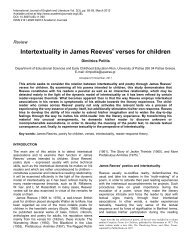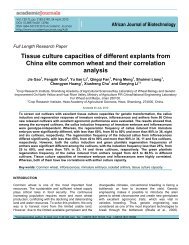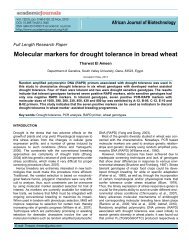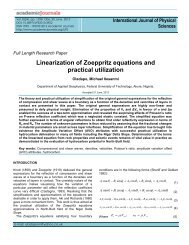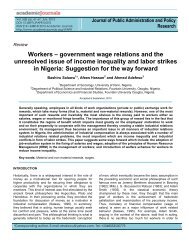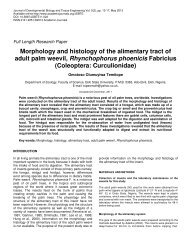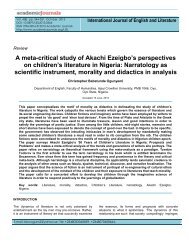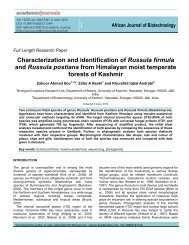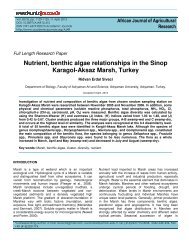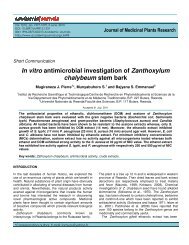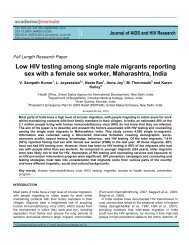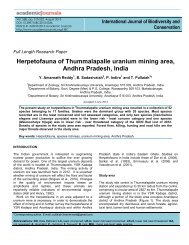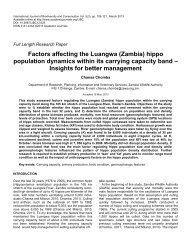Economic development and change in Tanzania since independence
Economic development and change in Tanzania since independence
Economic development and change in Tanzania since independence
Create successful ePaper yourself
Turn your PDF publications into a flip-book with our unique Google optimized e-Paper software.
African Journal of Political Science <strong>and</strong> International Relations Vol. 3 (4), pp. 259-267, May, 2009<br />
Available onl<strong>in</strong>e at http://www.academicjournals.org/AJPSIR<br />
ISSN 1996-0832 © 2009 Academic Journals<br />
Full Length Research Paper<br />
<strong>Economic</strong> <strong>development</strong> <strong>and</strong> <strong>change</strong> <strong>in</strong> <strong>Tanzania</strong> s<strong>in</strong>ce<br />
<strong>in</strong>dependence: The political leadership factor<br />
Honest Prosper Ngowi<br />
<strong>Economic</strong>s Department, Mzumbe University, P. O. Box 20266 Dar Es Salaam, <strong>Tanzania</strong>. E-mail:<br />
pngowi2002@yahoo.com. Tel.: (255) 754 653740.<br />
Accepted 12 March, 2009<br />
The author makes a critical exam<strong>in</strong>ation of the contribution of political leadership <strong>in</strong> the economic<br />
<strong>development</strong> <strong>and</strong> <strong>change</strong> of <strong>Tanzania</strong> s<strong>in</strong>ce her 1961 political <strong>in</strong>dependence from Brita<strong>in</strong>. He divides the<br />
country’s economic <strong>development</strong> <strong>and</strong> <strong>change</strong> <strong>in</strong>to three more or less discrete time epochs. The first<br />
epoch is the period from <strong>in</strong>dependence to 1967; the second is from the 1967 Arusha Declaration to the<br />
mid-1980s <strong>and</strong> the third is from the mid-1980s reforms to the present time (2007). The outst<strong>and</strong><strong>in</strong>g<br />
general economic <strong>development</strong>s <strong>and</strong> <strong>change</strong> <strong>in</strong> each epoch are identified. A critical analysis on the<br />
extent to which the <strong>development</strong>s <strong>and</strong> <strong>change</strong> <strong>in</strong> each epoch can be attributed to the political<br />
leadership of the time or even of the past is made. It is found <strong>in</strong> the work that, the economic<br />
<strong>development</strong>s <strong>and</strong> <strong>change</strong> <strong>in</strong> <strong>Tanzania</strong> can be highly attributed to political leadership. Interest<strong>in</strong>gly <strong>and</strong><br />
contrary to the orthodox underst<strong>and</strong><strong>in</strong>g <strong>and</strong> narrow scope of some analyses, both the political<br />
leadership of the day <strong>and</strong> that of the past are found to be responsible for economic <strong>development</strong>s <strong>and</strong><br />
<strong>change</strong> <strong>in</strong> a particular epoch. Interest<strong>in</strong>gly also, it is found that political leadership outside <strong>Tanzania</strong>,<br />
especially among its neighbours, trade partners <strong>and</strong> the donor community, has far-reach<strong>in</strong>g impacts <strong>in</strong><br />
the country’s economic <strong>development</strong> <strong>and</strong> <strong>change</strong>. It is concluded <strong>in</strong> the paper that political leadership<br />
is an important factor <strong>in</strong> a country’s <strong>development</strong> <strong>and</strong> <strong>change</strong>. It is recommended that policy <strong>and</strong><br />
decision makers should facilitate a process where adequate political leadership for good <strong>development</strong><br />
<strong>and</strong> <strong>change</strong> is established, improved <strong>and</strong> ma<strong>in</strong>ta<strong>in</strong>ed. Recommendations for further studies <strong>in</strong>clude the<br />
need to review this work over time <strong>and</strong> conduct similar ones <strong>in</strong> other countries for the purpose of, <strong>in</strong>teralia,<br />
comparisons <strong>and</strong> learn<strong>in</strong>g lessons.<br />
Key words: <strong>Economic</strong> <strong>development</strong> <strong>and</strong> <strong>change</strong>, <strong>Tanzania</strong>, political factor.<br />
INTRODUCTION<br />
<strong>Economic</strong> <strong>development</strong> <strong>and</strong> <strong>change</strong> <strong>in</strong> any society <strong>and</strong> at<br />
all times has been a function of many, complex <strong>and</strong> <strong>in</strong>terrelated<br />
factors. These factors <strong>in</strong>clude social, technological,<br />
climatic, f<strong>in</strong>ancial, natural <strong>and</strong> political factors. In<br />
some cases, one <strong>and</strong> the same factor may have been<br />
responsible for both positive <strong>and</strong> economic <strong>development</strong><br />
<strong>and</strong> <strong>change</strong>. In some cases however, some factors may<br />
be responsible for either positive or negative <strong>development</strong><br />
<strong>and</strong> <strong>change</strong> but not for both. This work focuses on<br />
the political factor as an explanatory variable for the<br />
economic <strong>development</strong> <strong>and</strong> <strong>change</strong> <strong>in</strong> <strong>Tanzania</strong> s<strong>in</strong>ce<br />
<strong>in</strong>dependence.<br />
It is to be understood that <strong>Tanzania</strong> is a republic with<br />
an executive president. It has been a s<strong>in</strong>gle party state<br />
with free elections from <strong>in</strong>dependence to 1995. Political<br />
pluralism was <strong>in</strong>troduced <strong>in</strong> the country <strong>in</strong> 1995 follow<strong>in</strong>g<br />
a referendum. S<strong>in</strong>ce then there have been multiparty<br />
major elections after every five years <strong>in</strong> which Chama<br />
Cha Map<strong>in</strong>duzi – CCM – literally translated to mean<br />
Revolutionary Party - has been w<strong>in</strong>n<strong>in</strong>g the presidency<br />
<strong>and</strong> majority seats <strong>in</strong> the parliament. Other major political<br />
parties (opposition) <strong>in</strong>clude Chama Cha Demokrasia na<br />
Maendeleo – CHADEMA – literally translated to mean<br />
Party of Democracy <strong>and</strong> Development; Civic United Front<br />
(CUF); Democratic Party (DP); <strong>Tanzania</strong> Labor Party<br />
(TLP) <strong>and</strong> United Democratic Party (UDP).<br />
After her political <strong>in</strong>dependence <strong>in</strong> 1961, <strong>Tanzania</strong> has<br />
experienced three major epochs of economic <strong>development</strong><br />
<strong>and</strong> <strong>change</strong>s. The author argues that the <strong>change</strong>s<br />
were ma<strong>in</strong>ly due to political factors ma<strong>in</strong>ly with<strong>in</strong> <strong>Tanzania</strong>.<br />
The three different epochs are outl<strong>in</strong>ed <strong>in</strong> this work<br />
<strong>and</strong> a discussion on the political factor beh<strong>in</strong>d the
260 Afri. J. Pol. Sci Int. Relat.<br />
observed economic <strong>development</strong> <strong>and</strong> <strong>change</strong> is done.<br />
ORGANISATION OF THE REST OF THE PAPER<br />
After the <strong>in</strong>troduction, follows the follow<strong>in</strong>g ma<strong>in</strong> sections:<br />
methodology; conceptual <strong>and</strong> theoretical issues; three<br />
ma<strong>in</strong> epochs <strong>in</strong> the economic <strong>development</strong> <strong>and</strong> <strong>change</strong> <strong>in</strong><br />
<strong>Tanzania</strong> <strong>and</strong> the <strong>in</strong>fluence of the political factor; conclusions<br />
<strong>and</strong> implications; <strong>and</strong> recommendations for future<br />
studies.<br />
METHODOLOGY AND APPROACH<br />
This work is based on the review <strong>and</strong> analysis of seconddary<br />
data sources. It takes a historical perspective of the<br />
economic <strong>development</strong> <strong>and</strong> <strong>change</strong> <strong>in</strong> <strong>Tanzania</strong> from<br />
1961 to 2007. The observed economic <strong>development</strong> <strong>and</strong><br />
<strong>change</strong> are then attributed to the political factor ma<strong>in</strong>ly<br />
with<strong>in</strong> the country.<br />
CONCEPTUAL AND THEORETICAL ISSUES<br />
The key conceptual <strong>and</strong> theoretical issues <strong>in</strong> this paper<br />
are briefly described <strong>in</strong> this section. The aim is to contextualize<br />
<strong>and</strong> locate the work with<strong>in</strong> specific conceptual <strong>and</strong><br />
theoretical frameworks. The ma<strong>in</strong> conceptual <strong>and</strong> theoretical<br />
issues <strong>in</strong> this work are <strong>development</strong> <strong>and</strong> political<br />
leadership. These are briefly described <strong>in</strong> what follows.<br />
Development<br />
The academic literature on <strong>development</strong> <strong>in</strong> general <strong>and</strong><br />
economic <strong>development</strong> <strong>in</strong> particular is rich of discourse.<br />
The concept of <strong>development</strong> emanates from the concepttualization<br />
of different schools of thoughts. It is a contested,<br />
multidimensional <strong>and</strong> multifaceted concept <strong>and</strong><br />
thus is looked at from many perspectives.<br />
Chambers (2004) argues that <strong>development</strong> has been<br />
taken to mean different th<strong>in</strong>gs at different times, <strong>in</strong> different<br />
places, <strong>and</strong> by different people <strong>in</strong> different professsions<br />
<strong>and</strong> organizations. The dom<strong>in</strong>ant mean<strong>in</strong>gs have<br />
been those attributed by economists <strong>and</strong> used <strong>in</strong> economics.<br />
In all cases has been normative <strong>and</strong> it has <strong>in</strong>volved<br />
<strong>change</strong>. Development is equated with economic <strong>development</strong>,<br />
<strong>and</strong> economic <strong>development</strong> <strong>in</strong> turn with economic<br />
growth. The underly<strong>in</strong>g mean<strong>in</strong>g of <strong>development</strong> has<br />
been good <strong>change</strong> <strong>in</strong> the realm of ecology, economics,<br />
society, politics <strong>and</strong> <strong>in</strong>deed <strong>in</strong> all spheres of life.<br />
For Seers (1972), <strong>development</strong> is creat<strong>in</strong>g conditions for<br />
the realization of human personality, reduction of poverty,<br />
social <strong>in</strong>equalities <strong>and</strong> improvement <strong>in</strong> creat<strong>in</strong>g<br />
employment opportunities. Todaro (1985) views <strong>development</strong><br />
as a multidimensional process <strong>in</strong>volv<strong>in</strong>g major<br />
<strong>change</strong>s <strong>in</strong> social structures, popular attitude, national<br />
<strong>in</strong>stitutions, acceleration of growth, <strong>and</strong> reduction of<br />
<strong>in</strong>equality <strong>and</strong> eradication of absolute poverty.<br />
In as far as UNDP (1997) is concerned; <strong>development</strong> is<br />
about enlarg<strong>in</strong>g people’s choices. The range of choices is<br />
context-specific. It varies depend<strong>in</strong>g on the <strong>in</strong>dividuals<br />
concerned <strong>and</strong> the country <strong>in</strong> question. The UNDP (ibid)<br />
po<strong>in</strong>ts out that there are four major elements <strong>in</strong> the<br />
concept of <strong>development</strong>, particularly human <strong>development</strong>.<br />
These are productivity, equity, susta<strong>in</strong>ability <strong>and</strong><br />
empowerment.<br />
Zdeck (1994) narrows down the term economic <strong>development</strong><br />
to economic <strong>and</strong> community <strong>development</strong>, which<br />
accord<strong>in</strong>g to him are not separate agendas. <strong>Economic</strong><br />
<strong>development</strong> is a process <strong>and</strong> approach used to create<br />
jobs, assets, <strong>and</strong> an <strong>in</strong>vestment climate <strong>in</strong> distressed<br />
neighborhoods <strong>and</strong> cannot be separated from community<br />
<strong>development</strong>. <strong>Economic</strong> <strong>development</strong> impacts <strong>and</strong> is<br />
impacted by key social <strong>and</strong> political factors <strong>in</strong> a community<br />
rang<strong>in</strong>g from access to quality education <strong>and</strong> social<br />
services to the availability of decent <strong>and</strong> affordable<br />
hous<strong>in</strong>g.<br />
Needless to say, the description of the concept of <strong>development</strong><br />
above is far from exhaustive. With so many<br />
varied views on the concept, the need for a work<strong>in</strong>g<br />
def<strong>in</strong>ition of the <strong>development</strong> concept is clear.<br />
In the context of this paper, the term <strong>development</strong> is<br />
taken to mean the process of mov<strong>in</strong>g from a low to a<br />
higher <strong>and</strong> more advanced stage <strong>in</strong> various contexts –<br />
socially, politically, economically, legally, morally, adm<strong>in</strong>istratively<br />
etc. it is acknowledged here that there may be<br />
negative <strong>development</strong> too. For the purpose of this paper<br />
the focus is on economic <strong>development</strong>.<br />
<strong>Economic</strong> <strong>development</strong> is one of the many dimensions<br />
of general <strong>development</strong>. The author perceives economic<br />
<strong>development</strong> as a process of mov<strong>in</strong>g from a bad to better<br />
economic variables like national <strong>in</strong>come; economic<br />
growth; primary commodity production to <strong>in</strong>dustrial <strong>and</strong><br />
services sector production; employment; <strong>in</strong>vestments;<br />
balance of payment; <strong>in</strong>flation <strong>and</strong> other economic fundamentals.<br />
Accord<strong>in</strong>g to Pass et al. (2000), economic <strong>development</strong><br />
is an upward movement of the entire social system <strong>and</strong><br />
atta<strong>in</strong>ment of a number of ideals of modernization such<br />
as rise <strong>in</strong> productivity, social <strong>and</strong> economic equalization,<br />
modern knowledge, improved <strong>in</strong>stitutions <strong>and</strong> attitudes<br />
<strong>and</strong> rationally coord<strong>in</strong>ated system of policy measures that<br />
can remove the host of undesirable conditions <strong>in</strong> the social<br />
system that have perpetuated a state of under<strong>development</strong>.<br />
<strong>Economic</strong> <strong>development</strong> <strong>in</strong>volves growth <strong>and</strong> <strong>change</strong>. It<br />
<strong>in</strong>cludes improved performance of the factors of production<br />
<strong>and</strong> improved production techniques. It also<br />
<strong>in</strong>volves <strong>development</strong> of <strong>in</strong>stitutions <strong>and</strong> <strong>change</strong> <strong>in</strong> attitudes<br />
<strong>and</strong> values. <strong>Economic</strong> <strong>development</strong>, as is the case<br />
for many other aspects of <strong>development</strong>, is a process. It is<br />
a dynamic <strong>and</strong> fluid not static <strong>and</strong> solid process.<br />
It should be noted that economic <strong>development</strong> is not<br />
necessarily equal to <strong>in</strong>creased social welfare. Issues of<br />
what is produced, who produces it, how is the growth dis-
tributed, how is the environment protected <strong>and</strong> quality of<br />
life <strong>in</strong> general are some of the more important dimensions<br />
of social welfare <strong>and</strong> improved liv<strong>in</strong>g st<strong>and</strong>ards more than<br />
just a mere <strong>in</strong>crease <strong>in</strong> output.<br />
Development <strong>in</strong>dicators: Development <strong>in</strong>dicators are<br />
parameters (measures) that can be used to assess whether<br />
there is <strong>development</strong> <strong>in</strong> a given area at a particular<br />
time <strong>and</strong> whether this <strong>development</strong> is <strong>in</strong>creas<strong>in</strong>g, stagnant<br />
or decreas<strong>in</strong>g over time. Such <strong>in</strong>dicators <strong>in</strong>clude<br />
macro-economic variables like Gross Domestic Product<br />
(GDP); Gross National Product (GNP); <strong>in</strong>flation rate;<br />
levels of <strong>in</strong>vestment <strong>and</strong> national debt. They also <strong>in</strong>clude<br />
birth <strong>and</strong> death rates (measured by <strong>in</strong>fant <strong>and</strong> maternal<br />
mortality rates); morbidity (measured by specific causes<br />
of deaths); education levels atta<strong>in</strong>ed (measured by<br />
literacy <strong>and</strong> numeracy rates <strong>and</strong> life skills <strong>in</strong> a population);<br />
hous<strong>in</strong>g (measured by the material used for<br />
roof<strong>in</strong>g); availability of <strong>and</strong> accessibility to social services<br />
<strong>and</strong> amenities like hospitals, health facilities, safe <strong>and</strong><br />
clean dr<strong>in</strong>k<strong>in</strong>g water, school etc (measured by the distance<br />
from human settlements to the place where these<br />
are found); availability of <strong>and</strong> accessibility to <strong>in</strong>frastructure<br />
– both hard (traditional) like roads, railways,<br />
ports, airports, harbours <strong>and</strong> telecommunication <strong>and</strong> soft<br />
(modern) like Internet; <strong>and</strong> life expectance (measured by<br />
number of years that one expects to live from time of<br />
birth). Applicability <strong>and</strong> <strong>in</strong>terpretation of the <strong>in</strong>dicators will<br />
differ from place to place <strong>and</strong> time to time.<br />
Political leadership<br />
Accord<strong>in</strong>g to Soanes <strong>and</strong> Stevenson (2003), politics<br />
relates to ideas <strong>and</strong> strategies of government or public<br />
affairs of a country. In this paper, political leadership is<br />
taken to mean the role of politicians <strong>in</strong> giv<strong>in</strong>g vision <strong>and</strong><br />
strategies <strong>and</strong> creat<strong>in</strong>g conducive environment for<br />
implementation of formulated policies. These policies aim<br />
at, among other th<strong>in</strong>gs, br<strong>in</strong>g<strong>in</strong>g about economic <strong>development</strong><br />
<strong>and</strong> <strong>change</strong>.<br />
The literature on political leadership, as is for the<br />
concept of <strong>development</strong>, is widespread. A search for<br />
“Political Leadership” <strong>in</strong> Google Scholar search eng<strong>in</strong>e on<br />
7 th June 2007, gave a total of 690,000 hits. Among the<br />
authors that have dwelt on the political leadership question<br />
<strong>in</strong> the literature <strong>in</strong>clude Hyden (1999) who worked on<br />
top-down democratization <strong>in</strong> <strong>Tanzania</strong> <strong>and</strong> Miguel (2004)<br />
who worked on national build<strong>in</strong>g <strong>and</strong> public goods <strong>in</strong><br />
Kenya versus <strong>Tanzania</strong>. Lupogo (2001) addressed the<br />
question of civil-military relations <strong>and</strong> political stability <strong>in</strong><br />
<strong>Tanzania</strong> while Samoff <strong>and</strong> Graham<br />
(1975) worked on local politics <strong>and</strong> the structure of power<br />
<strong>in</strong> <strong>Tanzania</strong>.<br />
Among the few available academic works that somehow<br />
attempted to relate political leadership to economic<br />
<strong>development</strong> <strong>and</strong> <strong>change</strong> <strong>in</strong> <strong>Tanzania</strong> are those by<br />
Carney (1977) who worked on Nyerere <strong>and</strong> the emer-<br />
Ngowi 261<br />
gence of a socialist strategy; an untitled work with no<br />
author’s name, (available onl<strong>in</strong>e at<br />
http://www.empereur.com/tanzania.html) which is on the<br />
agriculture sector dur<strong>in</strong>g <strong>and</strong> after Nyerere’s <strong>Tanzania</strong><br />
<strong>and</strong> Bienen <strong>and</strong> Herbst (1996) whose work focused on<br />
the relationship between political <strong>and</strong> economic reform <strong>in</strong><br />
Africa.<br />
Bienen <strong>and</strong> Herbst (1996) correctly argue that analyses<br />
of the relationship between regime type <strong>and</strong> economic<br />
management have not been very illum<strong>in</strong>at<strong>in</strong>g. They<br />
acknowledge that there have a number of works that<br />
have attempted to underst<strong>and</strong> the relationship between<br />
democracy <strong>and</strong> economic growth. Accord<strong>in</strong>g to the<br />
authors, the works have been conducted across a very<br />
broad range of countries <strong>in</strong>stead of focus<strong>in</strong>g on specific<br />
problems faced by African countries that are try<strong>in</strong>g to<br />
democratize.<br />
Now that no known work has been done to systematically<br />
attempt to attribute economic <strong>development</strong> <strong>and</strong><br />
<strong>change</strong> <strong>in</strong> <strong>Tanzania</strong> to the political leadership factor, this<br />
work attempts to fill this serious gap <strong>in</strong> knowledge. The<br />
conceptual framework that guides this work is presented<br />
<strong>in</strong> the section that follows.<br />
CONCEPTUAL FRAMEWORK<br />
In what follows, the conceptual framework that guides<br />
this work is presented. The ma<strong>in</strong> focus of the work is to<br />
discuss the role of the political leadership factor <strong>in</strong> economic<br />
<strong>development</strong> <strong>and</strong> <strong>change</strong> <strong>in</strong> <strong>Tanzania</strong> from the<br />
1961 <strong>in</strong>dependence to 2007. The discussion is based on<br />
attribut<strong>in</strong>g economic <strong>development</strong> <strong>and</strong> <strong>change</strong> <strong>in</strong> the<br />
country to political leadership factor. It should be understood<br />
that this is not a documentation or evaluation of<br />
economic <strong>development</strong> <strong>and</strong> <strong>change</strong> <strong>in</strong> <strong>Tanzania</strong>. It is an<br />
attempt to describe the role of the political leadership factor<br />
<strong>in</strong> <strong>Tanzania</strong>’s three ma<strong>in</strong> epochs of economic <strong>development</strong><br />
<strong>and</strong> <strong>change</strong>.<br />
It is understood that economic <strong>development</strong> <strong>and</strong><br />
<strong>change</strong> <strong>in</strong> any country is a non-l<strong>in</strong>ear function of many<br />
variables. The political leadership factor is only one of<br />
these. It is argued <strong>in</strong> this work that political leadership<br />
factor is one of the key factors. <strong>Economic</strong> actors do not<br />
operate <strong>in</strong> a political vacuum. Their actions <strong>and</strong> omissions<br />
are highly <strong>in</strong>fluenced <strong>and</strong> shaped by political decisions<br />
that <strong>in</strong> turn <strong>in</strong>fluence the environment <strong>in</strong> which the<br />
actors operate. The k<strong>in</strong>d of political decisions that are<br />
made depend largely on the political leadership of the<br />
day. Other factors that <strong>in</strong>fluence <strong>and</strong> impact economic<br />
<strong>development</strong> <strong>and</strong> <strong>change</strong> <strong>in</strong>clude technology; f<strong>in</strong>ancial,<br />
physical <strong>and</strong> human resources; <strong>in</strong>frastructure; forces of<br />
nature <strong>and</strong> a comb<strong>in</strong>ation of these.<br />
THE ROLE OF POLITICAL LEADERSHIP IN<br />
TANZANIA’S ECONOMIC DEVELOPMENT AND<br />
CHANGE<br />
<strong>Tanzania</strong> has experienced three ma<strong>in</strong> epochs of econo-
262 Afri. J. Pol. Sci Int. Relat.<br />
mic <strong>development</strong> <strong>and</strong> <strong>change</strong> s<strong>in</strong>ce her <strong>in</strong>depen-dence <strong>in</strong><br />
1961. The epochs are presented here, along with<br />
discussion of the role of the political leadership factor <strong>in</strong><br />
def<strong>in</strong><strong>in</strong>g <strong>and</strong> shap<strong>in</strong>g these major <strong>development</strong>s <strong>and</strong><br />
<strong>change</strong>s.<br />
The 1961 – 1967 epoch<br />
Some background <strong>in</strong>formation to <strong>in</strong>troduce this epoch is<br />
necessary. Before the political <strong>in</strong>dependence <strong>in</strong> 1961,<br />
Tanganyika’s (<strong>Tanzania</strong>’s name before its union with<br />
Zanzibar <strong>in</strong> 1964) economy was under its colonial masters.<br />
It was first under the Germany colonialists (1885 –<br />
1918) before be<strong>in</strong>g under the British colonialists up to the<br />
<strong>in</strong>dependence. Colonization of Tanganyika, as it was for<br />
other countries, was ma<strong>in</strong>ly a result of political decisions<br />
<strong>in</strong> the colonial countries. It was a result of, among other<br />
th<strong>in</strong>gs, the political leadership factor <strong>in</strong> those countries<br />
that aimed to exp<strong>and</strong> their empires. This can be evidenced<br />
by, <strong>in</strong>ter-alia, the Berl<strong>in</strong> conference on divid<strong>in</strong>g<br />
Africa between European political powers.<br />
Colonialism made a profound impact on the economic<br />
<strong>development</strong> <strong>and</strong> <strong>change</strong> <strong>in</strong> the colonized countries. The<br />
general economic motives of colonization were acquisition<br />
of raw materials for economic <strong>development</strong> <strong>in</strong> the<br />
colonial countries. Colonialism brought cash economy<br />
with it. Colonies, <strong>in</strong>clud<strong>in</strong>g Tanganyika, became suppliers<br />
of raw materials like m<strong>in</strong>erals <strong>and</strong> agricultural commodities<br />
<strong>and</strong> buyers of processed manufactured goods. The<br />
economic structure that was established by the colonial<br />
powers has had many <strong>and</strong> far-reach<strong>in</strong>g implications<br />
almost fifty years after the <strong>in</strong>dependence of many African<br />
countries. For an account of some of these effects, see<br />
Rodney (1972) on how Europe underdeveloped Africa.<br />
For German colonial policies <strong>and</strong> their <strong>in</strong>fluence on <strong>development</strong><br />
<strong>and</strong> exploitation <strong>in</strong> ma<strong>in</strong>l<strong>and</strong> <strong>Tanzania</strong> for the<br />
period 1884 – 1914, see Sunseri (1997).<br />
The political decisions to acquire colonies therefore,<br />
have been the base for many economic <strong>development</strong>s<br />
<strong>and</strong> <strong>change</strong> for many countries. It has been a source of<br />
the past <strong>and</strong> current economic structures; determ<strong>in</strong>ant of<br />
trade partners <strong>and</strong> even <strong>in</strong>vestments <strong>in</strong>flows. The political<br />
leadership that resulted <strong>in</strong>to colonialism has also been<br />
among the sources of conflicts <strong>and</strong> wars <strong>in</strong> Africa. This<br />
has been responsible for negative economic <strong>development</strong><br />
<strong>and</strong> <strong>change</strong> <strong>in</strong> some conflict-ridden countries.<br />
After <strong>in</strong>dependence, <strong>Tanzania</strong> concentrated on build<strong>in</strong>g<br />
an <strong>in</strong>dependent nation. The economy cont<strong>in</strong>ued to be<br />
ma<strong>in</strong>ly with<strong>in</strong> the h<strong>and</strong>s of the British colonial masters<br />
<strong>and</strong> Asian bus<strong>in</strong>essmen, ma<strong>in</strong>ly Arabs <strong>and</strong> Indians.<br />
Industries, plantations, banks, m<strong>in</strong>es <strong>and</strong> relatively large<br />
commercial activities cont<strong>in</strong>ued to be under the British<br />
<strong>and</strong> Asians. The economy cont<strong>in</strong>ued to be basically a<br />
market-oriented one with private sector capitalism domi-<br />
nat<strong>in</strong>g. The political structure was characterized by a s<strong>in</strong>gle<br />
party of Tanganyika African National Union (TANU) up to<br />
1964 when Tanganyika <strong>and</strong> Zanzibar united. The political<br />
party <strong>in</strong> Zanzibar, Afro Shirazi Party cont<strong>in</strong>ued to exist<br />
along with TANU up to the 5 th February 1977 when the<br />
two parties united to form the current rul<strong>in</strong>g party of<br />
Chama Cha Map<strong>in</strong>duzi (CCM).<br />
Accord<strong>in</strong>g to Kaiser (1996), after Tanganyika’s <strong>in</strong>dependence,<br />
“…efforts were made to implement a programme<br />
which depended on foreign <strong>in</strong>vestment to<br />
support massive, capital-<strong>in</strong>tensive <strong>in</strong>dustrialization <strong>and</strong><br />
agricultural <strong>development</strong> projects.” This was the country’s<br />
first five-year plan. The political decision just after <strong>in</strong>dependence<br />
therefore was to cont<strong>in</strong>ue with the capitalist<br />
mode of production <strong>in</strong>herited from colonial masters. It can<br />
be argued therefore that the relationship between political<br />
actors (TANU leadership) <strong>and</strong> economic policy was one<br />
<strong>in</strong> which the leaders followed more or less the policies<br />
<strong>in</strong>herited from colonial masters. The <strong>in</strong>terests of coloialists<br />
were cont<strong>in</strong>ued <strong>in</strong> this epoch.<br />
As expected from the key tenets of capitalism that<br />
<strong>in</strong>clude private ownership of major means of production<br />
<strong>and</strong> market oriented economic practices, a number of<br />
imbalances were observed by the mid 1960s. The political<br />
decision to embrace capitalism after <strong>in</strong>dependence<br />
led to a number of market failures as the state did not<br />
<strong>in</strong>tervene <strong>in</strong> the economy. The expected “fruits” of <strong>in</strong>dependence<br />
were not realized by the majority of people.<br />
Poverty cont<strong>in</strong>ued to dom<strong>in</strong>ate <strong>and</strong> the common man <strong>and</strong><br />
woman did not see the benefits of <strong>in</strong>dependence from<br />
economic po<strong>in</strong>t of view. They cont<strong>in</strong>ued to toil for the<br />
same colonial masters they had toiled for before <strong>in</strong>dependence.<br />
This unfortunate situation was observed by the<br />
political leaders of the day. A new political decision to<br />
address the imbalances brought by capitalism was made.<br />
The decision has had many <strong>and</strong> far-reach<strong>in</strong>g impacts <strong>in</strong><br />
the economic <strong>development</strong> <strong>and</strong> <strong>change</strong> <strong>in</strong> the country’s<br />
economic <strong>development</strong> <strong>and</strong> <strong>change</strong> process. This is<br />
discussed <strong>in</strong> the section on the second epoch of the<br />
country’s <strong>development</strong> <strong>and</strong> <strong>change</strong> process.<br />
The 1967 – mid 1980s epoch<br />
The political <strong>and</strong> economic l<strong>and</strong>scape of <strong>Tanzania</strong><br />
<strong>change</strong>d dramatically <strong>in</strong> 1967. This was a result of a political<br />
decision that gave birth to Arusha Declaration that<br />
was proclaimed <strong>in</strong> this year. This was a blue pr<strong>in</strong>t that<br />
declared that <strong>Tanzania</strong> would be follow<strong>in</strong>g Ujamaa (This<br />
is a k<strong>in</strong>d of African socialism) policy. The policy implied<br />
that the country would be follow<strong>in</strong>g socialist oriented economic<br />
<strong>and</strong> political policies. The capitalist, private sector<br />
market-led economy that was <strong>in</strong>herited from the colonial<br />
power at <strong>in</strong>dependence was replaced by state owned,<br />
centrally planned <strong>and</strong> controlled economy. All the major<br />
means of production <strong>in</strong> the country (<strong>in</strong>dustries, plantaions,<br />
commerce, m<strong>in</strong>es etc) were nationalized <strong>and</strong> put<br />
<strong>in</strong>to government h<strong>and</strong>s. The state became the major<br />
owner, controller <strong>and</strong> manager of the state owned enterprises<br />
(SOEs). These are parastatals that were formed<br />
follow<strong>in</strong>g nationalization of private property. The political
decision that gave birth to the Arusha Declaration made<br />
the end of capitalist mode of production <strong>in</strong> <strong>Tanzania</strong>. This<br />
was a major <strong>and</strong> dramatic <strong>change</strong> <strong>in</strong> <strong>Tanzania</strong>’s economic<br />
<strong>development</strong> that the country has to live with for<br />
many years after 1967.<br />
The Arusha Declaration has received substantial citation<br />
<strong>in</strong> the academic literature. Author’s search for<br />
“Arusha Declaration” <strong>in</strong> Google Scholar search eng<strong>in</strong>e on<br />
9 th June 2007 gave a total of 2,930 hits. Among these<br />
<strong>in</strong>clude Nyerere (1967) <strong>in</strong> which the declaration <strong>in</strong><br />
general <strong>and</strong> Ujamaa doctr<strong>in</strong>e <strong>in</strong> particular is described as<br />
<strong>Tanzania</strong>’s outl<strong>in</strong>e of its policy on socialism <strong>and</strong> selfreliance.<br />
Kaiser (1996) correctly attributes the emergence of the<br />
Arusha declaration to the failures of the first five year plan<br />
that was adopted by <strong>Tanzania</strong> just after <strong>in</strong>dependence.<br />
The plan was not yield<strong>in</strong>g the anticipated results. Ruralurban<br />
<strong>development</strong> differentials <strong>in</strong>creased, local expertise<br />
rema<strong>in</strong>ed <strong>in</strong>adequate <strong>and</strong> l<strong>and</strong> <strong>and</strong> labour resources<br />
were underutilized. Accord<strong>in</strong>g to Kaiser (1996), “Given<br />
these imbalances, President Julius Nyerere presented an<br />
alternative vision <strong>in</strong> 1967 as outl<strong>in</strong>ed <strong>in</strong> the Arusha<br />
Declaration”. Kaiser (1996) argues that the then rul<strong>in</strong>g<br />
political party of Tanganyika African National Union<br />
(T.A.N.U) called <strong>in</strong>to question the benefits of modernization<br />
policies by challeng<strong>in</strong>g the basic tenets of capitalism.<br />
In Ste<strong>in</strong> (1985), it is po<strong>in</strong>ted out that the political party<br />
of T.A.N.U “…called the Government to exercise control<br />
over means of production <strong>and</strong> move away from overreliance<br />
on foreign assistance <strong>in</strong> <strong>development</strong>…F<strong>in</strong>ally,<br />
T.A.N.U called for <strong>change</strong>s <strong>in</strong> the party to ensure that it<br />
conta<strong>in</strong>ed only committed socialists”. Ste<strong>in</strong> (1985), correctly<br />
po<strong>in</strong>ts out that “In the wake of this announcement,<br />
the Government nationalized private banks, took over<br />
major ownership of the seven largest firms, <strong>and</strong> acquired<br />
complete control of the National Insurance Corporation”.<br />
Lev<strong>in</strong> (2001), correctly po<strong>in</strong>ts out that Arusha Declaration<br />
“…came to <strong>change</strong> <strong>Tanzania</strong>’s policy environment<br />
dramatically. The Declaration ushered <strong>in</strong> a new policy<br />
direction for the country, a break from the fairly orthodox<br />
economic policies followed dur<strong>in</strong>g the first years after<br />
<strong>in</strong>dependence”. Emphasis was on public ownership <strong>and</strong><br />
<strong>in</strong>dividual <strong>in</strong>itiatives <strong>and</strong> the role of the private sector<br />
were sidel<strong>in</strong>ed. The objective was to build a socialist egalitarian<br />
society with public ownership of the economy.<br />
The Arusha Declaration is described by Lonsdale<br />
(1968) as a socialist experiment on “…Socialism <strong>and</strong><br />
Self-Reliance <strong>and</strong> the nationalizations of the banks, the<br />
export-import houses <strong>and</strong> some of the major manufactur<strong>in</strong>g<br />
enterprises”.<br />
Good-<strong>in</strong>tentioned as it might have been, the political<br />
decision to practice centrally planned economy with public<br />
ownership <strong>and</strong> government <strong>in</strong>tervention did not work<br />
well. The nationalization of the productive sectors of the<br />
economy has been among the major reasons for poor<br />
economic <strong>development</strong> <strong>in</strong> <strong>Tanzania</strong>. The hither-to private<br />
Ngowi 263<br />
sector owned <strong>and</strong> managed enterprises became public<br />
enterprises. They were typically characterized by <strong>in</strong>adequate<br />
managerial <strong>and</strong> technical skills; embezzlement;<br />
capacity under-utilization; reliance on government subsidies;<br />
non-payment of taxes; over-employ<strong>in</strong>g; protected<br />
from imports; <strong>and</strong> monopolistic <strong>in</strong> nature. As a result they<br />
became loss-mak<strong>in</strong>g entities that depended on government<br />
subsidies for their survival. As public enterprises,<br />
they did not pay tax to their owner either. It is not surpris<strong>in</strong>g<br />
therefore that most of these SOEs came to a virtual<br />
verge of collapse. They became heavily <strong>in</strong>debted <strong>and</strong><br />
employees were now <strong>and</strong> then sent <strong>in</strong>to long unpaid<br />
leaves.<br />
The Ujamaa policy did not give any <strong>in</strong>centive to the<br />
private sector enterprises. Private sector entrepreneurs<br />
were looked upon as exploiters <strong>and</strong> “enemies of the<br />
state”. Given the acknowledged roles of the private as<br />
opposed to public sector <strong>in</strong> economic <strong>development</strong> process,<br />
this epoch can be said to have been a lost period <strong>in</strong><br />
<strong>Tanzania</strong>’s economic <strong>development</strong> process. The superiority<br />
of the private sector over the public sector <strong>in</strong> the<br />
economic <strong>development</strong> process lies ma<strong>in</strong>ly on the former’s<br />
greater efficiency, effectiveness, vibrancy, dynamism,<br />
<strong>in</strong>novativeness, flexibility <strong>and</strong> profit orientation.<br />
See details <strong>in</strong>, among others, Ngowi (2006).<br />
It is not the purpose of this work to evaluate <strong>Tanzania</strong>’s<br />
economic performance under the Arusha Declaration. It<br />
is worth mention however that, accord<strong>in</strong>g to Lev<strong>in</strong> (2001),<br />
dur<strong>in</strong>g the period of Arusha Declaration per capita<br />
<strong>in</strong>comes grew by 0.7% per year. This was led by the<br />
public adm<strong>in</strong>istration sector with a sizeable contribution<br />
from agriculture <strong>and</strong> manufactur<strong>in</strong>g. Exports stagnated<br />
due to the policy environment that was hostile for exports.<br />
Government had monopoly on market<strong>in</strong>g of goods <strong>and</strong><br />
services. Inefficiencies drove down producer prices <strong>and</strong><br />
there was high effective protection of the import-substitut<strong>in</strong>g<br />
<strong>in</strong>dustrial sector. Trade controls, <strong>in</strong>stead of ex<strong>change</strong><br />
rate adjustment, were used as a means of adjust<strong>in</strong>g<br />
to external shocks. Suppression of private bus<strong>in</strong>ess<br />
limited opportunities for entrepreneurship.<br />
Control of prices, ex<strong>change</strong> rate, <strong>in</strong>terest rate, imports<br />
<strong>and</strong> exports added to the already hostile bus<strong>in</strong>ess <strong>and</strong><br />
<strong>in</strong>vestment climate.<br />
On the social services front however, it should be<br />
acknowledged that it is <strong>in</strong> this epoch that the state struggled<br />
to provide highly subsidized (up to 100% subsidy for<br />
some services) social services. Education (from primary<br />
to tertiary level), health <strong>and</strong> water were among such<br />
services. Look<strong>in</strong>g at the role of these services for economic<br />
<strong>development</strong>, especially education, the epoch should<br />
be seen as an era for <strong>in</strong>vestment <strong>in</strong> human capital. The<br />
<strong>in</strong>vestments <strong>in</strong> social services that took place at this<br />
epoch are among the current <strong>and</strong> future driv<strong>in</strong>g forces of<br />
economic <strong>development</strong> <strong>and</strong> <strong>change</strong> <strong>in</strong> <strong>Tanzania</strong>. These<br />
<strong>in</strong>clude all levels of education <strong>and</strong> health facilities. The<br />
political decision that led to nationalization <strong>and</strong> practice of<br />
a state planned <strong>and</strong> controlled economy therefore, has
264 Afri. J. Pol. Sci Int. Relat.<br />
had profound impacts <strong>in</strong> the economic deve-lopment <strong>and</strong><br />
<strong>change</strong> <strong>in</strong> <strong>Tanzania</strong>. The impacts stretch far beyond the<br />
epoch itself. Most of the senior <strong>and</strong> middle-level public<br />
<strong>and</strong> private sector officials contribut<strong>in</strong>g to <strong>Tanzania</strong>’s economic<br />
<strong>development</strong> today, for example, are products of<br />
the 1967 political decision to provide highly subsidized<br />
education <strong>and</strong> health services. The relatively <strong>in</strong>fant, small<br />
<strong>and</strong> weak private sector <strong>in</strong> Tan-zania today however, is a<br />
mirror image of the socialist past of the country.<br />
Political leadership factors outside <strong>Tanzania</strong> <strong>and</strong><br />
their impact on economic <strong>development</strong><br />
There are other political leadership factors outside <strong>Tanzania</strong><br />
that <strong>in</strong>fluenced <strong>and</strong> shaped economic <strong>development</strong><br />
<strong>and</strong> <strong>change</strong> <strong>in</strong> the country <strong>in</strong> this epoch. Some of these<br />
were direct <strong>and</strong> others <strong>in</strong>direct positive <strong>and</strong>/or negative<br />
impacts. Among those that had positive impacts <strong>in</strong>clude<br />
political decisions from the donor community to give<br />
<strong>development</strong> assistance to <strong>Tanzania</strong>. Development<br />
assistance is basically given based on political ideological<br />
sympathies. It depends largely on the political leadership<br />
of the political party that is <strong>in</strong> power both <strong>in</strong> the donor <strong>and</strong><br />
recipient countries. Traditionally, left w<strong>in</strong>g political parties<br />
with some socialist orientation (for example Sc<strong>and</strong><strong>in</strong>avian<br />
countries) have been more <strong>in</strong>cl<strong>in</strong>ed to give <strong>development</strong><br />
assistance to develop<strong>in</strong>g countries than right w<strong>in</strong>g parties<br />
were. In this epoch <strong>Tanzania</strong> ga<strong>in</strong>ed moral, material,<br />
technical, technological <strong>and</strong> f<strong>in</strong>ancial support for its economic<br />
<strong>development</strong> ma<strong>in</strong>ly from socialist oriented countries<br />
like Ch<strong>in</strong>a, the then United Soviet Socialist Republic<br />
(USSR), Canada <strong>and</strong> Sc<strong>and</strong><strong>in</strong>avian countries of Norway,<br />
Sweden <strong>and</strong> Denmark.<br />
The epoch was, co<strong>in</strong>cidentally, the era of cold war<br />
between the capitalist West <strong>and</strong> socialist East. <strong>Tanzania</strong><br />
chose to be <strong>in</strong> the Non Aligned Movement, mak<strong>in</strong>g it possible<br />
to get <strong>development</strong> assistance for its economic<br />
<strong>development</strong> from the capitalist block too. This is an<br />
important political decision that <strong>in</strong>fluenced the country’s<br />
economic <strong>development</strong> which has ma<strong>in</strong>ly been dependent<br />
on donor f<strong>in</strong>anc<strong>in</strong>g.<br />
A substantial political decision that negatively impacted<br />
<strong>Tanzania</strong>’s economic <strong>development</strong> <strong>in</strong> this era was the<br />
1978/79 war with Ug<strong>and</strong>a. The dictatorial political leadership<br />
of Iddi Am<strong>in</strong> <strong>in</strong> Ug<strong>and</strong>a resulted <strong>in</strong>to war over<br />
border <strong>in</strong> Kagera region of <strong>Tanzania</strong>. The costs of wag<strong>in</strong>g<br />
war can be seen as the economic <strong>development</strong> opportunity<br />
cost. The f<strong>in</strong>ancial, human <strong>and</strong> time resources that<br />
are devoted to war can not at the same time be used for<br />
economic <strong>development</strong>. Destruction of <strong>in</strong>frastructure <strong>and</strong><br />
properties, time that civilians are unable to work optimally<br />
<strong>and</strong> lives that are lost because of war, impact economic<br />
<strong>development</strong> immensely.<br />
The literature on the impacts of war on economic <strong>development</strong><br />
is abundant. Among these <strong>in</strong>clude Ades <strong>and</strong><br />
Chua (1997) who found that regional <strong>in</strong>stability <strong>and</strong><br />
domestic political <strong>in</strong>stability have strong negative effects<br />
on a country’s economic performance. This takes place<br />
through lowered trade with<strong>in</strong> <strong>and</strong> between unstable<br />
regions <strong>and</strong> countries; <strong>in</strong>creased military <strong>and</strong> defense<br />
expenditure; they also found that government expenditure<br />
on education was lower <strong>in</strong> countries with politically<br />
unstable neighbours. Barbieri <strong>and</strong> Levy (1999), similar to<br />
Ades <strong>and</strong> Chua (1997) found that wars have negative<br />
impacts on <strong>in</strong>ternational, regional <strong>and</strong> national trade.<br />
Glick <strong>and</strong> Taylor (2005) studied the effects of war on bilateral<br />
trade for almost all countries with available data<br />
extend<strong>in</strong>g back to 1870. They found a large <strong>and</strong> persistent<br />
impacts of wars on trade, <strong>and</strong> hence on national <strong>and</strong><br />
global economic <strong>development</strong> <strong>and</strong> welfare. Similar f<strong>in</strong>d<strong>in</strong>gs<br />
are documented <strong>in</strong> Anderton <strong>and</strong> Carter (2001), who<br />
studied the impact of war on trade for 14 major power<br />
dyads <strong>and</strong> 13 non-major power dyads.<br />
No known work has documented the economic <strong>development</strong><br />
impact of the political decision that led to the<br />
1978/79 war <strong>in</strong> <strong>Tanzania</strong>. It is known by the author<br />
(through observation <strong>and</strong> experiential knowledge) however<br />
that the war had serious negative economic <strong>development</strong><br />
impacts. Among the economic <strong>in</strong>frastructure that<br />
were destructed <strong>in</strong> the 1978/79 war is the Kagera River<br />
bridge <strong>and</strong> sugar factory at Kyaka <strong>in</strong> Bukoba dis-trict.<br />
Other economic impacts of war are the reconstruct-tion<br />
costs after the war. Due to data problem, these economic<br />
costs of the 1978/79 war could not be quanti-fied <strong>in</strong><br />
monetary terms. However, it is uncontested <strong>and</strong> widely<br />
documented <strong>in</strong> the literature that, wars <strong>in</strong> general <strong>and</strong> the<br />
war under discussion <strong>in</strong> particular, have huge negative<br />
economic impacts to the countries that are directly <strong>and</strong><br />
<strong>in</strong>directly <strong>in</strong>volved. The ammunition <strong>in</strong>dustry though<br />
benefits from wars.<br />
Political leadership decisions <strong>and</strong> practices <strong>in</strong> some<br />
African countries negatively impacted <strong>Tanzania</strong>’s economic<br />
<strong>development</strong> <strong>in</strong> this epoch. These <strong>in</strong>clude colonial<br />
occupation <strong>in</strong> such countries like Zimbabwe (Southern<br />
Rhodesia), Mozambique <strong>and</strong> South Africa. <strong>Tanzania</strong>’s<br />
political belief has been that it cannot be free before the<br />
whole of Africa is free. This was operationalized by shar<strong>in</strong>g<br />
its already very meager resources to support liberation<br />
movements <strong>in</strong> these countries. It also supported<br />
freedom fighters <strong>and</strong> refugees from these countries that<br />
were based <strong>in</strong> <strong>Tanzania</strong>, <strong>in</strong>clud<strong>in</strong>g South Africans at the<br />
then Mazimbu camp <strong>in</strong> Morogoro region. This move<br />
necessarily dra<strong>in</strong>ed the already very limited resources for<br />
the country’s economic <strong>development</strong>.<br />
Data problem limits quantification of the pecuniary value<br />
of resources diverted from economic <strong>development</strong> <strong>in</strong><br />
<strong>Tanzania</strong> to support<strong>in</strong>g the noble course of fight<strong>in</strong>g for<br />
freedom <strong>in</strong> Africa. What is clear is that the political decisions<br />
to colonize Africa <strong>and</strong> practice apartheid on one<br />
h<strong>and</strong> <strong>and</strong> political decision by <strong>Tanzania</strong> to support freedom<br />
movements on the other, has resulted <strong>in</strong>to the<br />
necessary short term evil of lower economic <strong>development</strong><br />
<strong>in</strong> the country. In the long run however, the cost of the<br />
support may be offset by bus<strong>in</strong>ess <strong>and</strong> economic rela-
tions that may have their foundation on the ties established<br />
<strong>and</strong> strengthened at freedom movements.<br />
Political leadership <strong>in</strong> one country therefore, has<br />
potential many <strong>and</strong> far-reach<strong>in</strong>g impacts on other countries.<br />
A mere observation shows that <strong>in</strong>stability <strong>in</strong> one<br />
country is likely to have some negative impacts on other<br />
countries’ economic <strong>development</strong> <strong>and</strong> <strong>change</strong>. Political<br />
leadership <strong>in</strong> a country that leads to such <strong>in</strong>stabilities<br />
therefore, has impacts beyond the borders of the country<br />
<strong>in</strong> question. The role of regional <strong>and</strong> global stability,<br />
which is ma<strong>in</strong>ly a function of political leadership, on economic<br />
<strong>development</strong> <strong>and</strong> <strong>change</strong> <strong>in</strong> any country cannot be<br />
overemphasized.<br />
The mid-1980s epoch to date<br />
From the mid-1980s <strong>and</strong> especially from 1985, another<br />
major political decision was made <strong>in</strong> <strong>Tanzania</strong>. Follow<strong>in</strong>g<br />
the w<strong>in</strong>d of <strong>change</strong> across the globe, the country is <strong>in</strong> the<br />
midst of some major <strong>and</strong> far-reach<strong>in</strong>g reforms <strong>in</strong> the<br />
management of its economy, <strong>in</strong>ter-alia. This epoch therefore,<br />
can be referred to as the reform era. Generally, the<br />
reforms are the opposite of the 1967 political decision to<br />
embrace socialism. In this epoch, <strong>Tanzania</strong>’s political<br />
decision has been to embrace the capitalist economy<br />
which is market-oriented <strong>and</strong> private sector led. The<br />
relatively free <strong>in</strong>terplay of the market forces of supply <strong>and</strong><br />
dem<strong>and</strong>, <strong>and</strong> correctly so, is now the major def<strong>in</strong><strong>in</strong>g<br />
characteristic of the country’s economic <strong>development</strong> <strong>and</strong><br />
<strong>change</strong>.<br />
Among other th<strong>in</strong>gs, the epoch is characterized with<br />
major reforms. Among the elements of reform <strong>in</strong> <strong>Tanzania</strong><br />
<strong>in</strong>clude privatization of the SOE that were nationalized<br />
<strong>in</strong> the aftermath of the 1967 Arusha Declaration;<br />
relaxation of entry restrictions <strong>in</strong> virtually all economic<br />
sectors; deregulation <strong>in</strong> various <strong>in</strong>dustries; abolition of<br />
price controls; <strong>in</strong>dependence of the central bank; elim<strong>in</strong>ation<br />
of import licens<strong>in</strong>g; removal of: foreign ex<strong>change</strong>-,<br />
ex<strong>change</strong> rate- <strong>and</strong> <strong>in</strong>terest rate controls; eas<strong>in</strong>g of controls<br />
over mergers <strong>and</strong> acquisitions (M&As); public sector<br />
service reform; <strong>and</strong> political reforms <strong>in</strong> form of allow<strong>in</strong>g<br />
multiparty democracy.<br />
All of the above reform elements that are <strong>in</strong> place <strong>in</strong><br />
<strong>Tanzania</strong> today would not have been possible without the<br />
1985 political decision to depart from the 1967 political<br />
decision to embrace Marxist-Len<strong>in</strong>ist political <strong>and</strong> economical<br />
philosophical orientation. The reforms are hav<strong>in</strong>g<br />
profound impact <strong>in</strong> the economic <strong>development</strong> <strong>and</strong><br />
<strong>change</strong> <strong>in</strong> <strong>Tanzania</strong>.<br />
It is not with<strong>in</strong> the scope of this work to evaluate <strong>and</strong><br />
document the impacts of these reforms <strong>in</strong> <strong>Tanzania</strong>’s<br />
economic <strong>development</strong> <strong>and</strong> <strong>change</strong>. This has been done<br />
elsewhere <strong>in</strong> the author’s earlier works. See, among<br />
others, Ngowi (2007, 2006, 2005, 2002). Other impacts<br />
are documented <strong>in</strong> BoT et al. (2002, 2004) ma<strong>in</strong>ly on FDI<br />
<strong>in</strong>flows; Kanaan (2000) on success of trade liberalization;<br />
Ngowi 265<br />
Mug<strong>and</strong>a (2004) on what has <strong>and</strong> what has not worked<br />
on reforms’ aims to reduce poverty <strong>and</strong> susta<strong>in</strong><strong>in</strong>g<br />
growth; Wangwe (1995) on economic reforms <strong>and</strong> poverty<br />
alleviation; R<strong>and</strong>a (1999) on the reforms <strong>and</strong> the<br />
stability of the dem<strong>and</strong> for money <strong>in</strong> <strong>Tanzania</strong>; Temu <strong>and</strong><br />
Due (2000) on the bus<strong>in</strong>ess environment <strong>in</strong> <strong>Tanzania</strong><br />
after socialism <strong>and</strong> challenges of reform<strong>in</strong>g banks, parastatals,<br />
taxation <strong>and</strong> the civil service; Bigsten et al. (1999)<br />
on aid <strong>and</strong> reform; <strong>and</strong> Morrissey (1995) on tax policy<br />
reform.<br />
Among the key impacts of the reforms that are documented<br />
<strong>in</strong> the works cited above <strong>in</strong>clude substantial<br />
<strong>in</strong>flows of foreign direct <strong>in</strong>vestments (FDIs) <strong>in</strong> form of<br />
mergers <strong>and</strong> acquisition (M&As) of the former SOE <strong>and</strong><br />
Greenfield Investments <strong>and</strong> their associated benefits.<br />
Acquisitions of the former SOE that are under divestiture,<br />
among other th<strong>in</strong>gs, relieve the state from the burden of<br />
own<strong>in</strong>g <strong>and</strong> manag<strong>in</strong>g these enterprises. Such burdens<br />
<strong>in</strong>clude payment of subsidies <strong>and</strong> lost tax <strong>in</strong>comes, all of<br />
which are of critical importance <strong>in</strong> the economic <strong>development</strong><br />
<strong>and</strong> <strong>change</strong> <strong>in</strong> the country.<br />
Other FDI benefits <strong>in</strong>clude direct <strong>and</strong> <strong>in</strong>direct <strong>and</strong> often<br />
better pay<strong>in</strong>g employment opportunities; reduc<strong>in</strong>g <strong>in</strong>vestment<br />
capital gap; <strong>in</strong>troduc<strong>in</strong>g up to date <strong>and</strong> state of the<br />
art technologies; superior managerial, leadership <strong>and</strong><br />
market<strong>in</strong>g skills; <strong>in</strong>creas<strong>in</strong>g government revenues<br />
through privatization proceeds, fees, concessions, dividends<br />
on profits, <strong>and</strong> taxes; support<strong>in</strong>g community social<br />
<strong>development</strong> projects; forward <strong>and</strong> backward l<strong>in</strong>kages<br />
with the rest of the economy <strong>and</strong> generally <strong>in</strong>creas<strong>in</strong>g to<br />
the supply side of quantity <strong>and</strong> quality of goods <strong>and</strong><br />
services <strong>in</strong> the economy.<br />
The political decision of the mid-1980s has some potential<br />
negative impacts <strong>in</strong> the economic <strong>development</strong><br />
<strong>and</strong> <strong>change</strong> <strong>in</strong> <strong>Tanzania</strong>. Some of these <strong>in</strong>clude <strong>in</strong>troduction<br />
<strong>and</strong> practice of the concept of cost-shar<strong>in</strong>g <strong>in</strong> key<br />
social services.<br />
The services <strong>in</strong>clude education, health <strong>and</strong> water. With<br />
36% of the country’s population below the poverty l<strong>in</strong>e<br />
(URT, 2005); <strong>in</strong>vestments <strong>in</strong> human capital <strong>in</strong> form of<br />
education <strong>and</strong> health may be threa-tened. In the long run<br />
therefore, dem<strong>and</strong> for adequate human resources needed<br />
for economic <strong>development</strong> <strong>and</strong> <strong>change</strong> may be short<br />
of supply.<br />
The current capitalism <strong>in</strong> <strong>Tanzania</strong> differs somehow<br />
with the one <strong>in</strong> 1961 – 1967 epoch. Among the differences<br />
<strong>in</strong>clude the fact that the earlier one was a direct<br />
cont<strong>in</strong>uation of the colonial system. The colonial masters<br />
had more economic power <strong>in</strong> terms of ownership of major<br />
means of production compared to endogenous. It can be<br />
argued further that the former capitalist system was <strong>in</strong>voluntary<br />
<strong>and</strong> imposed to <strong>Tanzania</strong>.<br />
The current capitalism<br />
however <strong>in</strong>volves endogenous <strong>in</strong> the ownership of the<br />
major means of production. As opposed to the earlier<br />
one, the current capitalist system is a result of deliberate<br />
decisions by <strong>Tanzania</strong>’s political system.
266 Afri. J. Pol. Sci Int. Relat.<br />
Conclusion<br />
<strong>Tanzania</strong> has experienced three major epochs <strong>in</strong> its<br />
economic <strong>development</strong> <strong>and</strong> <strong>change</strong> process from the<br />
1961 <strong>in</strong>dependence to 2007. Political leadership has<br />
been the key factor <strong>in</strong> creation of the epochs. It has been<br />
the ma<strong>in</strong> def<strong>in</strong><strong>in</strong>g factor of the nature <strong>and</strong> paths of economic<br />
<strong>development</strong> <strong>and</strong> <strong>change</strong> <strong>in</strong> each of the epochs.<br />
Contrary to the generally held <strong>and</strong> simplified views, it is<br />
more than the political leadership <strong>and</strong> decisions <strong>in</strong><br />
<strong>Tanzania</strong> that have impacted <strong>and</strong> <strong>in</strong>fluenced economic<br />
<strong>development</strong> <strong>and</strong> <strong>change</strong> <strong>in</strong> the country. In this work,<br />
some political leadership <strong>and</strong> decisions outside <strong>and</strong><br />
<strong>in</strong>side <strong>Tanzania</strong> have been identified as among the key<br />
factors that impact economic <strong>development</strong> <strong>and</strong> <strong>change</strong> <strong>in</strong><br />
the country. It is recognized however that there are other<br />
factors than political leadership that have impacted, are<br />
impact<strong>in</strong>g <strong>and</strong> will be impact<strong>in</strong>g economic <strong>development</strong><br />
<strong>and</strong> <strong>change</strong> <strong>in</strong> <strong>Tanzania</strong>, as is the case for many other<br />
countries.<br />
POLICY IMPLICATIONS<br />
The role of the political leadership factor <strong>in</strong> economic<br />
<strong>development</strong> <strong>and</strong> <strong>change</strong> <strong>in</strong> countries should receive the<br />
attention it deserves <strong>in</strong> the policy <strong>and</strong> decision mak<strong>in</strong>g<br />
process. Underst<strong>and</strong><strong>in</strong>g that political decision with<strong>in</strong> a<br />
country are likely to impact other countries’ economic<br />
<strong>development</strong> <strong>and</strong> <strong>change</strong> both <strong>in</strong> the long <strong>and</strong> short run is<br />
essential. The need to cooperate <strong>and</strong> coord<strong>in</strong>ate relevant<br />
political decisions among countries cannot be overemphasized.<br />
RECOMMENDATIONS FOR FUTURE STUDIES<br />
There are a number of knowledge gaps that need to be<br />
filled <strong>in</strong> this work. These <strong>in</strong>clude quantification <strong>in</strong> monetary<br />
terms, of economic <strong>development</strong>s <strong>and</strong> <strong>change</strong> due to<br />
various political leadership <strong>and</strong> decisions. These may<br />
<strong>in</strong>clude cost-benefit analysis of the various political<br />
leadership <strong>and</strong> decisions identified <strong>in</strong> each of the three<br />
epochs. Data problem is however predicted due to a<br />
number of factors. The factors <strong>in</strong>clude none-availability,<br />
<strong>in</strong>adequacy, <strong>in</strong>accuracy <strong>and</strong> <strong>in</strong>accessibility of the key<br />
data to make a comprehensive cost-benefit analysis.<br />
The mid-1980s – to date epoch is essentially openended<br />
as it is not known for sure on how long it will<br />
cont<strong>in</strong>ue. There is a need therefore to update this study<br />
<strong>in</strong> the light of the impacts of various political decisions on<br />
the economic <strong>development</strong> <strong>and</strong> <strong>change</strong> <strong>in</strong> <strong>Tanzania</strong>.<br />
These are the political leadership decisions that have<br />
been made <strong>and</strong> are be<strong>in</strong>g made both with<strong>in</strong> <strong>and</strong> outside<br />
<strong>Tanzania</strong>. Similar studies can be conducted <strong>in</strong> other<br />
countries for, among other th<strong>in</strong>gs, comparison <strong>and</strong> experience<br />
shar<strong>in</strong>g.<br />
REFERENCES<br />
Ades A (1997). The Neighbour’s Curse: Regional Instability <strong>and</strong><br />
<strong>Economic</strong> Growth. J. Econ. Growth. 2: 279 – 304. Kluwer Academic<br />
Publishers, Boston.<br />
Anderton CH, Carter JR (2001). The Impact of War on Trade: An<br />
Interrupted Time-Series Study. J. Peace Res. 38(4):445-457. Onl<strong>in</strong>e<br />
at http://jpr.sagepub.com/cgi/content/abstract/38/4/445<br />
Barbieri K, Levy JS (1999). Sleep<strong>in</strong>g with the Enemy: The Impact of<br />
War on Trade. J. Peace Res. 36(4):463 – 479.<br />
Bienen H, Herbst J. (1996). The Relationship Between Political <strong>and</strong><br />
<strong>Economic</strong> Reform <strong>in</strong> Africa. Comparative Pol. 29(1):23 – 42.<br />
BoT – Bank of <strong>Tanzania</strong>. NBS – National Bureau of Statistics., TIC –<br />
<strong>Tanzania</strong> Investment Centre <strong>and</strong> ZIPA – Zanzibar Investment<br />
Promotion Agency (2002 <strong>and</strong> 2004). <strong>Tanzania</strong> Investment Report:<br />
Report on Foreign Private Investment <strong>in</strong> <strong>Tanzania</strong>.<br />
Bigsten A, Mutalemwa D, Tsikata Y, Wangwe S (1999). Aid <strong>and</strong><br />
Reform <strong>in</strong> <strong>Tanzania</strong>. Research Report, Goteborg University <strong>and</strong><br />
<strong>Economic</strong> <strong>and</strong> Social Research Foundation.<br />
BoT., NBS., TIC., ZIPA (2002 <strong>and</strong> 2004). Zanzibar Investment Report:<br />
Report on Foreign Private Investment <strong>in</strong> Zanzibar.<br />
Chambers R (2004). ‘Ideas for the Development: Reflect<strong>in</strong>g Forwards’.<br />
IDS Work<strong>in</strong>g Paper, Brighton, University of Sussex, UK.<br />
Glick R, Taylor AM (2005). Collateral Damage: Trade Disruption <strong>and</strong><br />
the <strong>Economic</strong> Impact of War. Federal Reserve Bank of San<br />
Francisco Work<strong>in</strong>g Paper Series 2005 – 11.<br />
Hyden G (1999). Top-Down Democratization <strong>in</strong> <strong>Tanzania</strong>. J.<br />
Democracy. 10(4):142 - 155<br />
Imai K, We<strong>in</strong>ste<strong>in</strong> J (2000). Measur<strong>in</strong>g the <strong>Economic</strong> Impact of Civil<br />
War. Center for International Development (University of Harvard)<br />
Work<strong>in</strong>g Paper No. 51<br />
Kaiser PJ (1996). Structural Adjustment <strong>and</strong> the Fragile Nation: The<br />
Demise of Social Unity <strong>in</strong> <strong>Tanzania</strong>. J. Mod Afr Stud. 34(2):227–<br />
237.<br />
Kanaan O (2000). <strong>Tanzania</strong>’s Experience with Trade Liberalization.<br />
F<strong>in</strong>ance & Development Magaz<strong>in</strong>e of International Monetary Fund<br />
(IMF), June 2000 37:2.<br />
Lev<strong>in</strong> J (2001). Taxation <strong>in</strong> <strong>Tanzania</strong>. United Nations University World<br />
Institute for Development <strong>Economic</strong> Research Discussion Paper No.<br />
20001/80.<br />
Lonsdale J (1968). The <strong>Tanzania</strong> Experiment. African Affairs. 67(269):<br />
330 – 344. Oxford University Press.<br />
Lupogo H (2001). Civil-military Relations <strong>and</strong> Political Stability. Africa<br />
Security Review 10:1 (http://www.empereur.com/tanzania.html<br />
Miguel E (2004). Tribe or Nation? National Build<strong>in</strong>g <strong>and</strong> Public Goods <strong>in</strong><br />
Kenya Versus <strong>Tanzania</strong>. World Politics 56:327 -362.<br />
Morrissey O (1995). Political Commitment, Institutional Capacity <strong>and</strong><br />
Tax Policy Reform <strong>in</strong> <strong>Tanzania</strong>. World Development, 23(4): 637 –<br />
649.<br />
Mug<strong>and</strong>a A (2004). <strong>Tanzania</strong>’s <strong>Economic</strong> Reforms <strong>and</strong> Lessons<br />
Learned. Paper Presented at the Scal<strong>in</strong>g Up Poverty Reduction: A<br />
Global Learn<strong>in</strong>g Process <strong>and</strong> Conference. Shanghai, May 25 – 27,<br />
2004.<br />
Ngowi HP (2007). Foreign Direct Investments (FDIs): Theories,<br />
Practices <strong>and</strong> Lessons <strong>in</strong> <strong>Tanzania</strong>. Unpublished book manuscript.<br />
Ngowi HP (2005). Institutional Reforms to Attract Foreign Direct<br />
Investments (FDIs) as a Strategy For <strong>Economic</strong> Growth: What Has<br />
<strong>Tanzania</strong> Done?” In Globalization, Technology, <strong>and</strong> Susta<strong>in</strong>able<br />
Development Series, Vol. 1, 2005 Emerald Publishers, Sussex<br />
University, United K<strong>in</strong>gdom, also <strong>in</strong> Afr. J. Pub. Adm<strong>in</strong>. Manage. 17:1.<br />
January 2006 Special Issue: Wealth Creation <strong>and</strong> Development <strong>in</strong><br />
Africa: Issues <strong>and</strong> Prospects. pp.32 – 44.<br />
Ngowi HP (2002). The Role of Foreign Direct Investments (FDIs) I<br />
Host Economies: A Focus on <strong>Tanzania</strong>. Unpublished, All But Disser-<br />
tation Thesis. Norwegian School of <strong>Economic</strong>s <strong>and</strong> Bus<strong>in</strong>ess<br />
Adm<strong>in</strong>istration.<br />
R<strong>and</strong>a J (1999). <strong>Economic</strong> Reform <strong>and</strong> the Stability of the Dem<strong>and</strong> for<br />
Money <strong>in</strong> <strong>Tanzania</strong>. J. Afr. Econ, (2 nd Ed). Oxford University Press<br />
8(3): 307 – 344.<br />
Samoff J, Graham JD (1975). <strong>Tanzania</strong>: Local Politics <strong>and</strong> the Structure<br />
of Power. Int. J. Afr. Hist. Stud. . Book Review. 8(3): 483 – 483<br />
Soanes C, Stevenson A (2003). Eds. Oxford Dictionary of English
Ste<strong>in</strong> H (1985). Theories of the State <strong>in</strong> <strong>Tanzania</strong>: A Critical<br />
Assessment. J. Mod Afr. Stud. 23(1): 105 – 123.<br />
Sunseri J (1997). Development for Exploitation: German Colonial<br />
Policies <strong>in</strong> Ma<strong>in</strong>l<strong>and</strong> <strong>Tanzania</strong>, 1884-1914. Afr. Affairs, Book Review<br />
96(382): 145-147.<br />
The agriculture sector dur<strong>in</strong>g <strong>and</strong> after Nyerere’s <strong>Tanzania</strong>, at<br />
http://www.empereur.com/tanzania.html. Visited on 15th September<br />
2008.<br />
Temu A, Due JM (2000). The Bus<strong>in</strong>ess Environment <strong>in</strong> <strong>Tanzania</strong> after<br />
Socialism: Challenges of Reform<strong>in</strong>g Banks, Parastatals, Taxation <strong>and</strong><br />
the Civil Service. J. Mod. Afr. Stud. Cambridge University Press.<br />
38(4): 683 – 712.<br />
Ngowi 267<br />
URT – United Republic of <strong>Tanzania</strong>. (2005). <strong>Tanzania</strong> Poverty <strong>and</strong><br />
Human Development Report. Mkuki <strong>and</strong> Nyota Publishers, Dar – Es<br />
– Salaam<br />
Wangwe S (1997). <strong>Economic</strong> Reforms <strong>and</strong> Poverty Alleviation <strong>in</strong><br />
<strong>Tanzania</strong>. <strong>Economic</strong> <strong>and</strong> Social Research Foundation Discussion<br />
Paper Series No. 016.<br />
World Bank (1997). World Development Report: The State <strong>in</strong> a<br />
Chang<strong>in</strong>g World. Wash<strong>in</strong>gton DC: World Bank. Web sources



